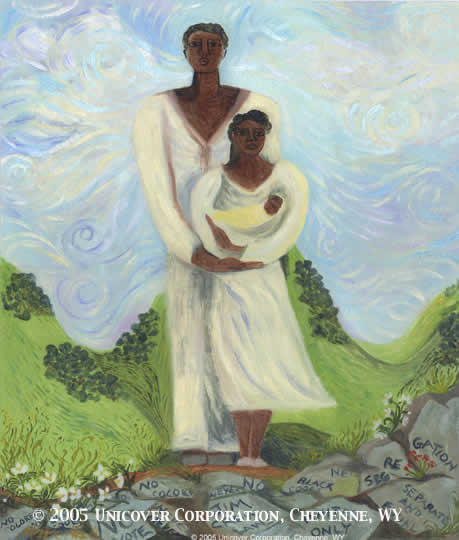
Issue 153 - October 6 2005
Press the F11 key for full screen view |
Mari Hall was commissioned to create original artwork for the Fleetwood "First Day Cover" of the United States Postal Service "1964 Civil Rights Act" Postage Stamp. The series of stamps, entitled "To Form a More Perfect Union" will be issued by the United States Post Office on August 30, 2005.
Description of Mari Hall's painting, on the Unicover Corporation Website: "Civil Rights Act (1964) In Mari Hall's masterpiece for the First Day Cover, the walls of segregation lie shattered beneath an African American couple and their child surrounded by the winds of change."
Mari's painting, entitled "Standing Tall on a New Day" accompanies the U.S. Postage stamp bearing the artwork of Jacob Lawrence ("Dixie Cafe" by Jacob Lawrence, 1948). Other artists commissioned for this historical series of First Day Covers include Dane Tilghman, Sylvia L. Walker, Keith Mallett and James Denmark, well known contemporary African American artists. Click here for on line information at Unicover.
Mari Hall's painting "Standing Tall on a New Day" will NOT be for sale through Mari Hall or BC. All reproduction and copyrights are assigned to Unicover. However, other work by Mari Hall is for sale through BlackCommentator.com. Additionally all art work represented by BC may be viewed by visiting the Art Works page of this Website.
MARI'S COMMENTARY ON HER PAINTING:
"STANDING TALL ON A NEW DAY"My intention was to show the positive aspect of the long struggle endured by African Americans to obtain equal rights under the US Constitution.
At first I was working with the idea of using the rainbow as a metaphor for newly gained hope, but as I progressed from the conceptual sketch to the painting itself, the rainbow no longer was part of my artist vision. I wanted to paint what I felt about the passage of the Civil Rights Act, and what this meant to the people of African American heritage.
I knew that there were a lot of people involved in the movement, but I opted to use the Universal Man, Woman & Child, as being representative of the African American population in America. I presented the Universal Man, Woman & Child clothed in simple white garments, representing purity of intent, and high spiritual goals. Their faces are dignified and solemn, rather than rejoiceful, for they well know that the price paid for their accomplishments came with a strong measure of pain, loss and frustration. I made these figures very tall in relationship to the background landscape because of the great heights they reached through their diligence and forbearance.
Perhaps the most far-reaching result of the Civil Rights Movement was the dismantling of the wall of segregation between the races. It is impossible to recognize the humanity of another person when a barrier of intimidation, fear and oppression exists. In the painting, I chose to show the "wall of segregation" as a crumbling and dismantled artifact, laying in ruins at the feet of the Universal Man, Woman & Child. The crumbling wall is shown in the front of the painting, incorporating words that represented the reality of segregation in the United States, like "Jim Crow Laws", "Black Codes" and "Never, Never".
In the painting, the winds of change are blowing around the Universal Family. I felt this was a more appropriate metaphor than the rainbow. The winds show the high energy that was needed to make the Civil Rights Movement achieve the high goals that it did, such as the 1964 Civil Rights Act being signed into law.
I wanted to show how important the passage of the Civil Rights Act was to the African American family. It is very important to have the means to sustain one's family, to provide for one's children, to embrace life without living in the shadows of constant fear. I wanted to show pride, dignity, and solemn resolve in the faces of the Universal Man & Woman.
The original painting is done in oil paint on multimedia art board.
I am very honored to contribute to this historical series, and to be able to share my vision of this great historical event.
Mari Hall
2005Art for the New Millennium
African American Folk Art
Mari Hall ~ Artist
www.marizart.comRepresented by BlackCommentator.com

